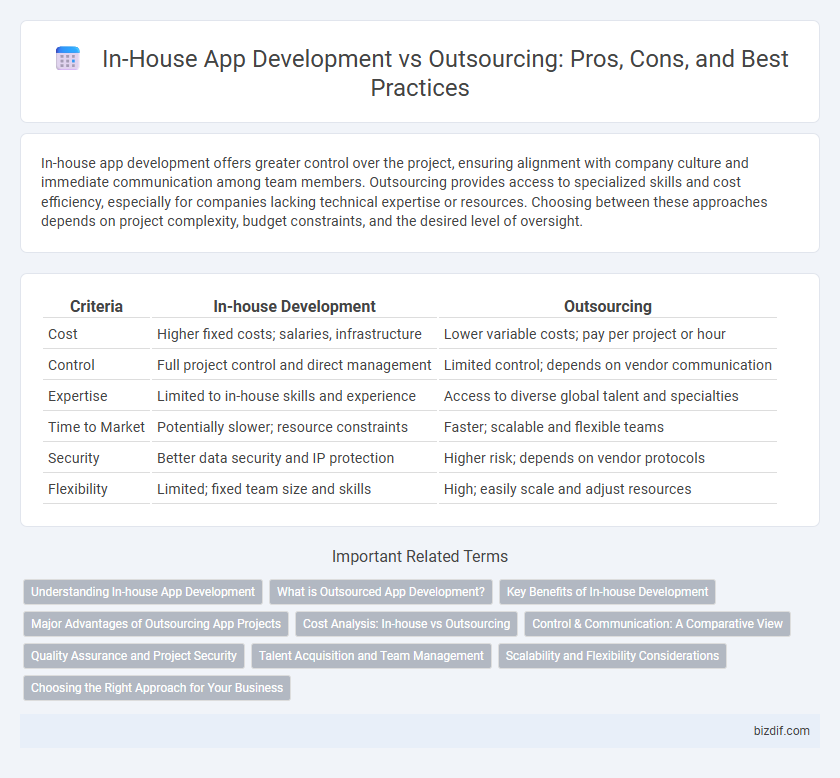In-house app development offers greater control over the project, ensuring alignment with company culture and immediate communication among team members. Outsourcing provides access to specialized skills and cost efficiency, especially for companies lacking technical expertise or resources. Choosing between these approaches depends on project complexity, budget constraints, and the desired level of oversight.
Table of Comparison
| Criteria | In-house Development | Outsourcing |
|---|---|---|
| Cost | Higher fixed costs; salaries, infrastructure | Lower variable costs; pay per project or hour |
| Control | Full project control and direct management | Limited control; depends on vendor communication |
| Expertise | Limited to in-house skills and experience | Access to diverse global talent and specialties |
| Time to Market | Potentially slower; resource constraints | Faster; scalable and flexible teams |
| Security | Better data security and IP protection | Higher risk; depends on vendor protocols |
| Flexibility | Limited; fixed team size and skills | High; easily scale and adjust resources |
Understanding In-house App Development
In-house app development involves building software internally using a dedicated team of developers who are deeply familiar with the company's goals, culture, and processes. This approach ensures greater control over the project, faster communication, and easier customization tailored to specific business needs. Companies investing in in-house development benefit from maintaining intellectual property rights and direct oversight of quality assurance and security measures.
What is Outsourced App Development?
Outsourced app development refers to hiring external companies or freelancers to design, build, and maintain mobile or web applications, leveraging specialized expertise and cost efficiency. This approach allows businesses to access a global talent pool, accelerate project timelines, and reduce overhead costs compared to in-house teams. Key factors in outsourced app development include effective communication, clear project specifications, and selecting vendors with proven experience in the relevant technology stack.
Key Benefits of In-house Development
In-house development enables direct control over the project, ensuring alignment with company goals and immediate communication among team members. It fosters deep product knowledge, resulting in faster iterations and customized solutions tailored to specific business needs. Additionally, maintaining proprietary expertise internally enhances security and intellectual property protection throughout the app development lifecycle.
Major Advantages of Outsourcing App Projects
Outsourcing app development projects significantly reduces operational costs by leveraging global talent pools with competitive pricing. It accelerates time-to-market through access to specialized experts who follow agile methodologies and advanced technologies. Outsourcing provides scalable resources, enabling companies to adapt quickly to changing project demands without the long-term commitment of in-house teams.
Cost Analysis: In-house vs Outsourcing
In-house app development involves fixed costs such as salaries, benefits, and infrastructure, often leading to higher initial expenses but greater long-term control and customization. Outsourcing offers variable costs with scalable pricing models, reducing upfront investment and accelerating time-to-market, though it may incur management overhead and potential communication barriers. Cost efficiency depends on project complexity, timeline, and the need for ongoing maintenance and updates.
Control & Communication: A Comparative View
In-house development offers direct oversight and seamless communication with the team, ensuring real-time collaboration and swift decision-making. Outsourcing can introduce challenges in control due to geographic and time zone differences, often requiring structured communication protocols to maintain alignment. Effective project management tools and clear contractual agreements mitigate risks by enhancing transparency and accountability in outsourced app development.
Quality Assurance and Project Security
In-house development ensures tighter quality control and direct oversight of testing processes, reducing the risk of defects and enhancing software reliability. Project security benefits from internal handling by limiting access to sensitive data and intellectual property within a trusted team. Outsourcing can introduce challenges in maintaining consistent QA standards and may increase vulnerability to data breaches due to external access.
Talent Acquisition and Team Management
In-house development ensures direct control over talent acquisition, enabling precise alignment with company culture and project requirements, which enhances team cohesion and communication efficiency. Outsourcing offers access to a diverse global talent pool and scalable resources, reducing recruitment overhead and expediting team assembly for specialized skills. Effective team management in in-house setups allows for continuous collaboration and immediate feedback, whereas outsourcing requires robust coordination tools and clear contract management to bridge geographical and operational gaps.
Scalability and Flexibility Considerations
In-house development offers greater control over scalability, enabling teams to rapidly adjust resources and priorities as project demands evolve. Outsourcing provides flexibility by accessing specialized skills and scaling development capacity without long-term commitments. Balancing in-house expertise with outsourcing partnerships optimizes scalability and adaptability in dynamic app development environments.
Choosing the Right Approach for Your Business
Selecting the right approach between in-house development and outsourcing depends on factors such as budget, project complexity, and required expertise. In-house teams offer better control and seamless communication, ideal for long-term projects with evolving requirements. Outsourcing provides cost-efficiency and access to specialized skills, making it suitable for short-term or resource-intensive tasks.
In-house Development vs Outsourcing Infographic

 bizdif.com
bizdif.com